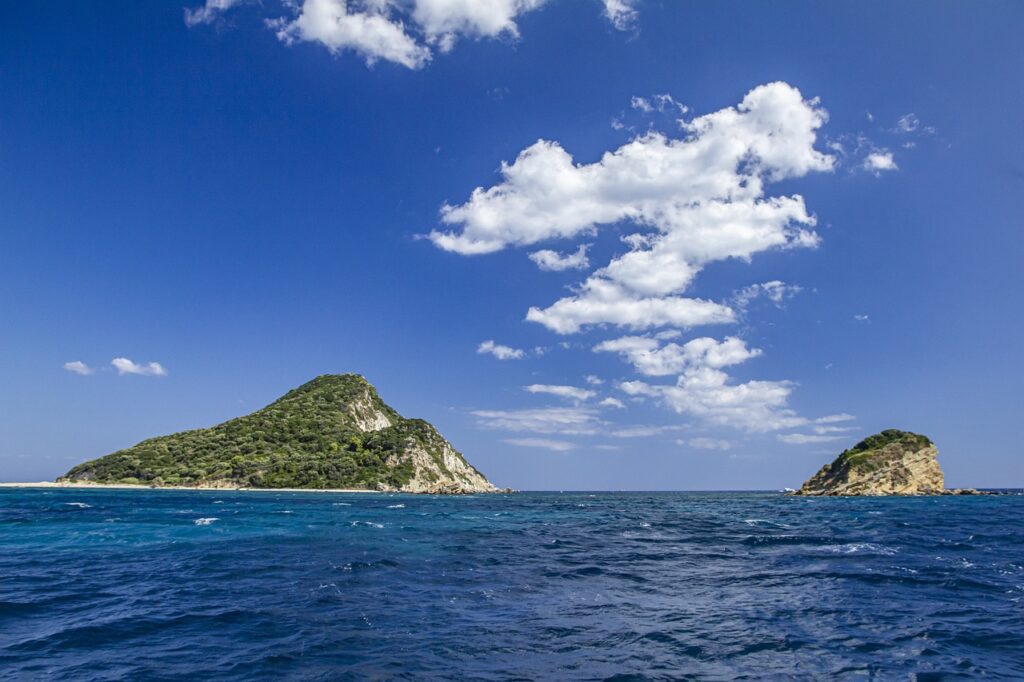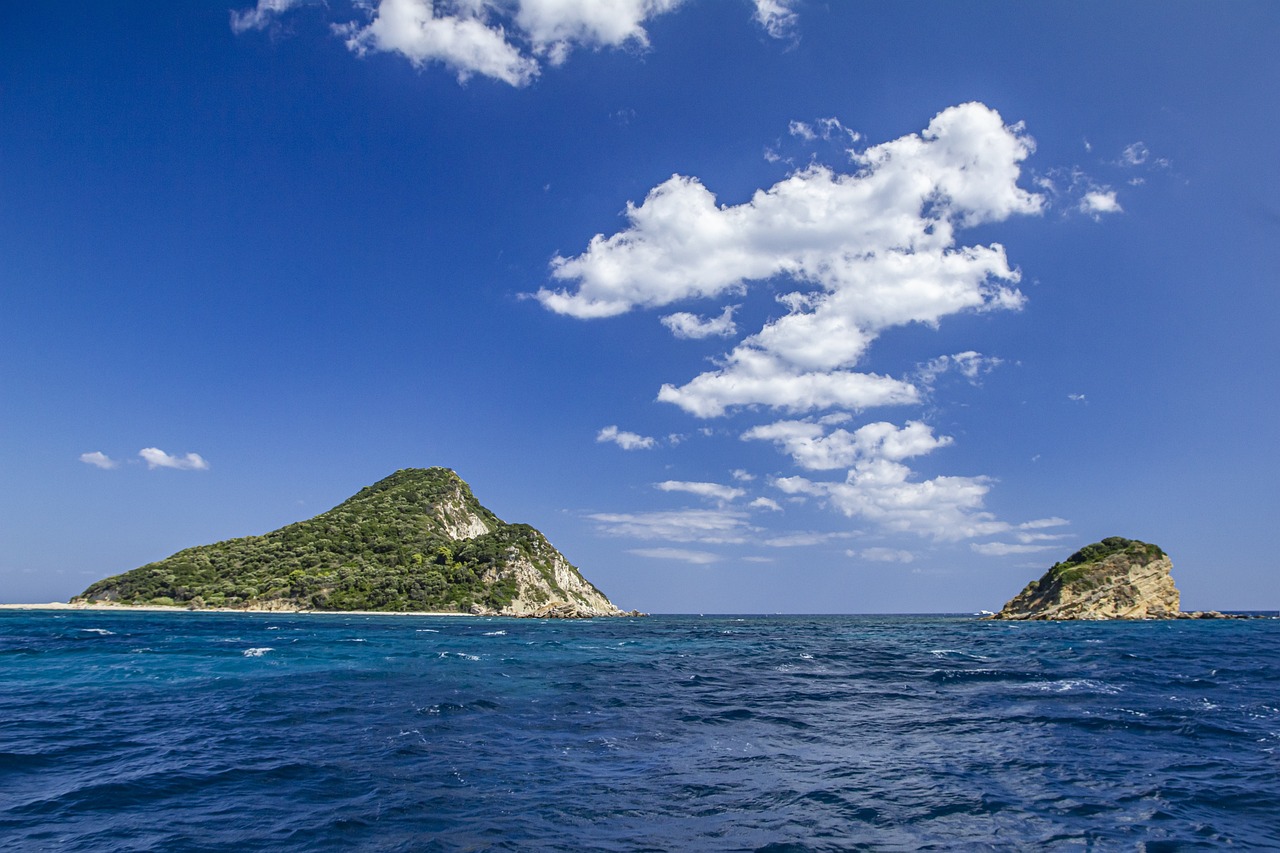Picture yourself basking under the warm Mediterranean sun on the vibrant Greek Islands, surrounded by crystal-clear turquoise waters and enchanting ancient ruins. Whether you’re a history enthusiast, a beach lover, or seeking the perfect blend of culture and relaxation, the Greek Islands offer an idyllic escape for every traveler. With so many islands to choose from, each with its own unique charm and allure, it can be overwhelming to decide where to begin. Fear not, for this comprehensive guide will help you navigate through the diverse landscapes and highlights of the Greek Islands, ensuring that you find the perfect island to suit your travel desires.
Getting to the Greek Islands

By Air
One of the most convenient ways to reach the Greek Islands is by air. There are numerous international airports scattered across the country, with the most popular ones located in Athens, Thessaloniki, and Crete. From these airports, you can easily catch domestic flights to several islands, including Mykonos, Santorini, Rhodes, and Corfu. The flight durations are relatively short, ranging from 30 minutes to an hour, depending on the distance between the islands.
By Ferry
For those who prefer a slower, more scenic journey, traveling to the Greek Islands by ferry can be a fantastic option. Greece has an extensive ferry network that operates throughout the year, connecting various islands with each other and with the mainland. The major ferry ports are located in Piraeus, Rafina, and Thessaloniki. Depending on the distance, ferry rides can take anywhere from a couple of hours to half a day. It’s important to note that ferry schedules are subject to change, especially during low season, so it’s advisable to check the timetables in advance.
Choosing the Right Greek Island
Popular Islands
The Greek Islands are renowned for their unique charm, stunning landscapes, and vibrant atmosphere. If you’re looking for a lively and cosmopolitan island experience, popular destinations like Mykonos and Santorini will not disappoint. Mykonos is famous for its vibrant nightlife and picturesque white-washed buildings, while Santorini is known for its breathtaking sunsets and cliffside villages. Other popular islands include Rhodes, Crete, and Corfu, each offering its distinct appeal and a wide range of attractions.
Off-the-beaten-path Islands
For those seeking a more tranquil and authentic Greek island experience, there are plenty of off-the-beaten-path islands to consider. Islands like Milos, Naxos, and Paros offer a slower pace of life and a glimpse into traditional Greek culture. These islands are characterized by their unspoiled beauty, charming villages, and secluded beaches. Exploring the lesser-known islands allows you to escape the crowds and immerse yourself in the peaceful ambiance of the Greek Islands.
Best Time to Visit the Greek Islands
Peak Season
The peak season in the Greek Islands falls between June and August when the weather is warm and sunny. During this time, the islands are bustling with tourists from all over the world. The peak season is perfect for beach lovers and partygoers, as the islands come alive with beach bars, clubs, and water sports activities. However, it’s important to note that prices can skyrocket, and popular attractions can get crowded. It’s advisable to book accommodations and ferry tickets well in advance if you plan to visit during the peak season.
Shoulder Season
The shoulder seasons, which include May and September, offer a more balanced experience. The weather is still warm, and the crowds are not as overwhelming as during the peak season. The prices for accommodations and flights are generally lower, making it an ideal time to visit if you want to avoid the peak season rush. Additionally, the shoulder season allows you to enjoy the beaches and attractions without jostling for space, providing a more relaxed and intimate atmosphere.

Off-Season
If you prefer a quieter and more budget-friendly trip, the off-season, which spans from October to April, might be the best choice for you. While the weather may be cooler and some tourist facilities may be closed, visiting during the off-season has its advantages. You can enjoy the islands’ natural beauty without the crowds, and the prices for accommodations and flights are significantly lower. It’s important to keep in mind that ferry schedules may be limited during this time, so it’s essential to plan your itinerary accordingly.
Planning Your Itinerary
Island Hopping
Island hopping is a popular way to explore the Greek Islands, allowing you to experience the diversity of each island and create a personalized itinerary. You can choose to visit multiple islands within a region, such as the Cyclades or the Ionian Islands, or mix and match islands from different regions. There are various ferry routes available, making it relatively easy to hop from one island to another. It’s recommended to spend at least a couple of days on each island to fully immerse yourself in its beauty and culture.
Staying on a Single Island
If you prefer a more relaxed and immersive experience, staying on a single island for the duration of your trip can be a great option. This allows you to delve deeper into the island’s attractions, soak up the local culture, and establish a deeper connection with the locals. You can spend your days exploring the island’s historical sites, relaxing on its beautiful beaches, indulging in local cuisine, and immersing yourself in the island’s unique way of life. Staying on a single island gives you the opportunity to fully immerse yourself in its charm and experience a slower pace of life.
Things to Do and See

Historical Sites
The Greek Islands are steeped in history and offer a treasure trove of archaeological sites to explore. One of the must-visit sites is the Acropolis in Athens, where you can admire the iconic Parthenon and other ancient Greek structures. On the island of Delos, you can explore the UNESCO World Heritage Site with its remarkable ruins and ancient temples. Rhodes boasts the impressive Palace of the Grand Master and the medieval Old Town, while Crete offers the opportunity to delve into the fascinating Minoan civilization at the Palace of Knossos.
Beaches and Water Activities
The Greek Islands are renowned for their pristine beaches and crystal-clear waters. From the black sand beaches of Santorini to the golden shores of Mykonos, there is a beach to suit every preference. Whether you’re looking for bustling beach clubs and water sports or secluded coves and peaceful bays, the Greek Islands have it all. You can indulge in swimming, snorkeling, kayaking, or simply relax on a sun lounger and soak in the Mediterranean sun.
Outdoor Adventures
Beyond the beaches, the Greek Islands offer plenty of opportunities for outdoor adventures. Hiking enthusiasts can explore the rugged landscapes of Samaria Gorge in Crete or hike to the top of Mount Zeus in Naxos for breathtaking panoramic views. Water sports enthusiasts can try their hand at windsurfing in Paros or scuba diving in Zakynthos to discover the vibrant underwater world. The islands also provide excellent conditions for sailing and yachting, allowing you to explore hidden coves and secluded beaches.

Local Cuisine and Wineries
Greek cuisine is renowned for its delicious flavors and fresh ingredients. Each island has its culinary specialties, offering a unique gastronomic experience. You can savor fresh seafood, traditional Greek dishes like moussaka and souvlaki, and indulge in a vast array of local wines. Many islands have their wineries, where you can take vineyard tours and sample their distinctive wines. Exploring the local cuisine and wineries is a must-do while visiting the Greek Islands, as it provides a glimpse into the vibrant culinary culture of the country.
Nightlife and Entertainment
The Greek Islands are famous for their vibrant nightlife and entertainment scene. Mykonos, in particular, is renowned for its lively party atmosphere, featuring world-class clubs and beach bars that attract international DJs and celebrities. Santorini offers a more sophisticated and romantic nightlife, with rooftop bars and cliffside restaurants that provide stunning views of the caldera. Many other islands also have vibrant nightlife options, ranging from cozy local taverns to trendy cocktail bars. Whether you’re a party animal or looking for a relaxed evening, the Greek Islands have something to offer for everyone.
Exploring Athens before Island Hopping
Acropolis and Parthenon
No trip to Athens is complete without visiting the iconic Acropolis and its crowning jewel, the Parthenon. The Acropolis is a UNESCO World Heritage Site and offers a glimpse into the ancient Greek civilization. You can climb up the hill and marvel at the meticulously preserved ruins, including the Parthenon, the Erechtheion, and the Temple of Athena Nike. The panoramic views of Athens from the Acropolis are truly breathtaking, especially during sunrise or sunset.

Plaka Neighborhood
Immerse yourself in the charming and historic Plaka neighborhood, located at the base of the Acropolis. This picturesque area is known for its narrow, winding streets lined with neoclassical buildings, traditional taverns, and souvenir shops. You can stroll through the quaint alleys, browse for unique handmade crafts, and enjoy a traditional Greek meal at one of the cozy taverns. Plaka is also home to several museums, such as the Museum of Greek Folk Art and the Jewish Museum of Greece.
National Archaeological Museum
If you’re interested in Greek history and art, a visit to the National Archaeological Museum is a must. Located in the heart of Athens, this museum houses a vast collection of ancient Greek artifacts, including sculptures, pottery, and jewelry. You can admire the iconic Mask of Agamemnon, the bronze statue of Poseidon, and the beautiful frescoes from the ancient city of Akrotiri. The museum offers a fascinating journey through Greece’s rich archaeological heritage and provides a deeper understanding of the country’s ancient civilization.
Accommodation Options
Luxury Resorts
If you’re looking for the ultimate indulgence and relaxation, the Greek Islands are home to a plethora of luxury resorts. These resorts offer world-class amenities, stunning locations, and impeccable service. From infinity pools overlooking the Aegean Sea to private villas with their own plunge pools, you can experience the epitome of luxury while surrounded by the islands’ natural beauty. Many luxury resorts also offer spa facilities, fine dining restaurants, and exclusive beach access, ensuring a truly unforgettable experience.
Boutique Hotels
For a more intimate and personalized stay, boutique hotels are a popular choice in the Greek Islands. These smaller-scale accommodations offer unique charm, stylish interiors, and a warm, welcoming atmosphere. You can choose from boutique hotels situated within traditional buildings in the heart of the island’s villages or those tucked away in secluded spots with stunning sea views. Boutique hotels often prioritize personalized service, ensuring that you feel like a valued guest rather than just a tourist.
Budget-Friendly Guesthouses
For travelers on a budget, there are plenty of affordable guesthouses and family-run accommodations available throughout the Greek Islands. These options provide comfortable rooms, basic amenities, and a friendly atmosphere without breaking the bank. Many guesthouses are located in the heart of the island’s villages, offering an authentic experience and the opportunity to interact with the locals. Staying in a budget-friendly guesthouse allows you to save money on accommodations, giving you more to spend on experiencing the islands’ attractions and local cuisine.
Camping
For the adventurous travelers who want to experience the great outdoors, camping is a viable option in the Greek Islands. There are several campsites scattered across the islands, offering facilities such as shower blocks, toilets, and cooking areas. Camping allows you to immerse yourself in nature, waking up to the sound of waves crashing on the shore and falling asleep under a sky full of stars. Just make sure to check the regulations and permitted areas for camping on each island, as rules may vary.
Getting Around the Islands
Public Transportation
The Greek Islands have a reliable and efficient public transportation system that makes it easy to explore the different islands. Buses are the most common mode of public transportation, connecting major towns and villages. They are relatively affordable and provide a convenient way to reach the popular sights and beaches. Additionally, some islands have local ferries or water taxis that offer transportation around the island or to nearby attractions. It’s important to check the schedules in advance, as the frequency of public transportation may vary depending on the season.
Renting a Vehicle
Renting a vehicle is a popular option for exploring the Greek Islands at your own pace. You can rent cars, scooters, or ATVs from various rental agencies located on the islands. This gives you the freedom to visit off-the-beaten-path destinations, access secluded beaches, and explore the islands’ hidden gems. However, it’s essential to note that some islands have narrow and winding roads, so driving experience and caution are required. Additionally, during the peak season, it’s advisable to book your vehicle in advance to ensure availability.
Walking and Cycling
Many of the Greek Islands are small enough to be explored by foot or bicycle, making walking and cycling great options for getting around. Most islands have well-maintained footpaths and cycling routes that allow you to enjoy the scenic landscapes and picturesque villages. Walking or cycling gives you the opportunity to discover hidden corners, interact with locals, and appreciate the islands’ natural beauty up close. You can rent bicycles from various rental shops on the islands, and some accommodations even provide bicycles for their guests’ use.
Navigating the Greek Island Culture
Language and Customs
The official language in Greece is Greek, and while English is spoken in most tourist areas, it’s always appreciated to learn a few basic Greek phrases. Locals will often warmly respond to your efforts to speak Greek, even if it’s just a simple “Kalimera” (good morning) or “Efharisto” (thank you). Greek culture is known for its hospitality, so don’t be surprised if you’re offered a shot of ouzo or a plate of local delicacies by friendly locals. It’s also customary to greet people with a handshake, maintain eye contact during conversations, and avoid excessive physical contact.
Etiquette and Tipping
When it comes to etiquette in the Greek Islands, it’s important to be respectful and mindful of local customs. It’s customary to greet people with a friendly “Yasou” (hello) or “Kalispera” (good evening) when you enter a shop or restaurant. Tipping is not mandatory in Greece, but it’s appreciated for good service. A 5-10% tip is generally appropriate in restaurants, especially if the service was exceptional. When visiting religious sites, it’s important to dress modestly, covering your shoulders and knees out of respect.
Useful Tips and Recommendations
Currency and Money Matters
The official currency in Greece is the Euro (EUR). It’s advisable to carry some cash with you, as many smaller establishments may only accept cash payments. However, major credit cards are widely accepted in hotels, restaurants, and larger stores. It’s recommended to notify your bank or credit card company of your travel plans to avoid any issues with card transactions. Additionally, it’s advisable to keep an eye on exchange rates and consider exchanging money at banks or authorized exchange bureaus to get the most favorable rates.
Health and Safety
The Greek Islands are generally considered safe for travelers, but it’s always essential to take basic precautions. Make sure to have appropriate travel insurance to cover any medical emergencies or unexpected events. It’s also advisable to pack a basic first aid kit with essentials like band-aids, pain relievers, and any necessary prescription medications. The sun can be intense, so it’s important to protect yourself with sunscreen, hats, and sunglasses. It’s also worth noting that tap water in the Greek Islands is generally safe to drink, but bottled water is widely available if you prefer.
Packing Essentials
When packing for your Greek Islands adventure, it’s important to consider the climate and activities you plan to engage in. The essentials include lightweight clothing for the warm weather, swimwear, comfortable walking shoes, and a sun hat. Don’t forget to pack sunscreen, insect repellent, and a reusable water bottle. If you plan to explore the historical sites, it’s advised to bring a modest outfit to respect the dress codes. Additionally, packing a travel adapter for your electronics and a portable charger is also recommended to ensure you can stay connected and capture memories throughout your trip.
As you embark on your journey to the Greek Islands, be sure to take the time to plan and prepare, allowing yourself to fully immerse in the beauty, culture, and welcoming atmosphere. Whether you choose to island hop or stay on a single island, explore historical sites or relax on the beaches, indulge in local cuisine or dive into the vibrant nightlife, the Greek Islands have something for every traveler. This comprehensive guide will help you make the most of your trip, ensuring that you create unforgettable memories in this iconic destination.
